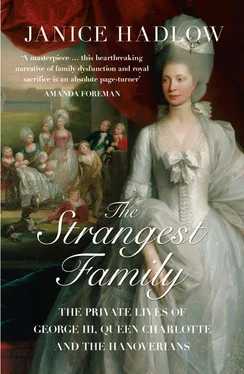Caroline was not the first royal wife to find herself married to a man whose mind did not match her own. Her Berlin mentor, Sophia Charlotte, found little common intellectual ground with her own princely husband, who, like Caroline’s George, preferred the study of pageantry and military decorations to the contemplation of big ideas. ‘Leibniz talked to me today of the infinitely little,’ Sophia once remarked. ‘My God, as though I did not know enough about that already.’ 39Such a comment would never have escaped Caroline’s lips. She decided early in their marriage that her intellect, of which she was justifiably proud, would never be used to undermine her husband, but would be dedicated instead to the strengthening and consolidation of their partnership. From the day she married George, she saw the preservation of their union and the advancement of their interests as the paramount duty of her role as his wife. She began as she meant to go on. As soon as she arrived in Hanover as a married woman, she took lessons in English, and persuaded her learning-averse husband to do the same. Leibniz heard that Caroline ‘had a decided turn for that language’ and that George was also making excellent progress. While he never lost his ‘his bluff Westphalian accent’, George was, Walpole thought, later to speak the language with far more ‘correctness’ than his wife. Caroline’s determination to master the language of the people she would one day rule was only part of a wider campaign to win their hearts and minds. She had already begun to plan for the moment when her father-in-law would inherit the British crown, and she and George would become Prince and Princess of Wales. The British envoy to Hanover noted that she behaved with special courtesy to British visitors; she employed British ladies in her household; ordered English novels to read; and had even begun to drink tea.
Her father-in-law viewed all these acts with the deepest suspicion, believing, with some justification, that his son and daughter-in-law were seeking to secure their own position at the cost of his own. When Queen Anne’s government somewhat unwisely offered the title of Duke of Cambridge to Prince George, his father was incensed, seeing it as a sign that his future British subjects sought the favour of his son more than they did his own. It hardened his resolve to treat the prince ‘as a person of no consequence’; nor did it make him feel more warmly disposed towards Caroline. Recognising her intelligence, he was convinced she encouraged the prince in what he regarded as acts of defiance, and referred to her as ‘ cette diablesse Mme la Princesse ’.
Caroline’s success in providing the dynasty with a male heir in 1707 did nothing to alter her father-in-law’s hostile attitude. On the contrary, the rejoicings in both England and Hanover that greeted the baby Frederick’s arrival only increased his suspicion of their popularity, and he refused to pay for any celebrations to mark the child’s birth. The appearance of a succession of other children – all daughters – between 1709 and 1713 was similarly ignored; and by the time the long-awaited call to Britain arrived in 1714, with the death of Queen Anne, the breach between the king and the prince was wider than ever.
*
The future George I arrived in London first, accompanied by his son. The three young princesses came next, with Caroline herself following on last. Her tardy departure perhaps reflected a reluctance to leave her only son, who, George I had decreed, would not travel with the rest of the family to London. Frederick was to stay in Hanover as a living reminder to the Hanoverians that their ruling family had not deserted them. Although he was only seven years old, Frederick was expected to preside over state functions, sitting alongside a large portrait of his elector grandfather propped up on a chair. He was not to see his family again for nearly fourteen years.
Once in London, it was quickly evident that the new king would much rather have stayed in Hanover with his grandson and his portrait. His new subjects were far from united in welcoming the incoming ruling family, some of them making their preference for the exiled Stuarts very apparent by word, gesture or riot. George I, for his part, was equally unenthused. He disliked England and its inhabitants from the start. It was soon noticed that ‘the king has no predilection for the English nation and never receives in private any English of either sex’, preferring to spend his time with his mistress, smoking a pipe and drinking German beer. 40His inability to speak the language isolated him – he was said to conduct political business with Robert Walpole in Latin – and he did not understand the complicated and somewhat ambivalent status of an English king, which left him with the strong conviction that the first objective of his new countrymen was to rob and insult him. The French ambassador reported that such was George’s dislike of his new kingdom that he did not consider it anything more ‘than a temporary possession to be made the most of whilst it lasts, rather than a perpetual inheritance to himself and his family’. 41
His son and his wife took a very different view. From the moment of their arrival, they strove to do all they could to impress and conciliate their new countrymen. The prince, though not yet completely fluent in English, showed a winning desire to improve, and would help himself out when words failed him ‘with a world of action’. He and Caroline were effusive in their praise for their new homeland, the prince calling the English ‘the best, the handsomest, the best shaped, the best natured and lovingest people in the world; if anyone would make their court to him, it must be by telling him he was like an Englishman’. 42Caroline, who was already regarded as ‘so charming that she could make anyone love her if she would’, employed a more vivid turn of phrase, declaring that she ‘would as soon live on a dunghill as return to Hanover’. 43
It was hardly surprising that, as the courtier Peter Wentworth observed: ‘I find all backward in speaking to the king but ready enough to speak to the prince.’ 44King George could not fail to be aware of the contrast between his embattled and unpopular position, and that of his son and daughter-in-law. The result was inevitable. The Duchess of Orléans, an avid transmitter of all the royal gossip of Europe, heard that things had gone from bad to worse between George I and his son. ‘His quarrel with the Prince of Wales gets worse every day. I always thought him harsh when he was in Germany, but English air has hardened him still more.’ 45
George and Caroline must bear some of the blame for what happened next. In making the contrast between their own reception and that of George I quite so plain, they had not, perhaps, behaved in the most tactful manner; they had burnished their own reputations and secured their own interests with scant consideration for the impact it would have on the new king. They must have realised their actions would elicit some response from a man whose brooding character they both knew very well. But they cannot have expected him to strike against them in the way that he did, in an action that was to echo miserably through the family for the rest of their lives.
It began with what should have been a celebration. On 13 November 1717, Caroline gave birth to a second son, a long-awaited boy after so many daughters, and the first Hanoverian to be born in Britain. The prince was delighted, and made arrangements for a grand christening. He asked his father and his uncle, the Prince-Bishop of Osnabrück, to stand as the baby’s godfathers. To this the king initially agreed; but just before the ceremony, the king insisted that the prince-bishop be replaced by the Duke of Newcastle, a politician he knew his son particularly disliked. Furious at what he perceived as a gross humiliation, the young George smouldered his way through the proceedings, held in Caroline’s bedroom. Walpole heard from his friend Lady Suffolk, who had been one of the shocked spectators, exactly what followed: ‘No sooner had the bishop closed the ceremony, than the prince crossing the feet of the bed in a rage, stepped up to the Duke of Newcastle, and holding up his hand and forefinger in a menacing attitude, said, “You are a rascal, but I shall find you out,” meaning in broken English, “I shall find a time to be revenged.”’ 46Newcastle, deeply disconcerted, asserted that the prince had challenged him to fight a duel, a very serious offence within the precincts of a royal palace. He complained to the king, who had been present but had not understood a word of what was said. George I immediately decided to regard his son’s words in the worst possible light. He told the prince to consider himself under arrest and confined both George and Caroline to their apartments.
Читать дальше












